
Russia-Ukraine conflict requires restraint
- Ukraine has gone on a war footing following Russian seizure of ships
- Incident reminds the world of all-but-forgotten conflict
A recent escalation of tension sparked by Russia’s seizure of three Ukrainian ships and arrests of their crew reminded the world of a conflict it has all but forgotten. Fighting between Ukrainian forces and groups loyal to Moscow over politics, influence and territory has been raging for five years in eastern Ukraine, killing 10,000 people, 3,000 of them civilians. There has been no shortage of distractions to take global attention away, among them the trade war between China and the United States, Britain’s leaving of the European Union and the rise of far-right and left-wing groups in Europe. But the latest crisis highlights the dangers and risks and the need for both sides and their allies to exercise restraint.
Ukraine has gone on a war footing, declaring martial law in provinces bordering the Sea of Azav, where the dispute took place on November 25. The move followed Russia’s firing on and capturing of two Ukrainian warships and a tugboat and 24 sailors trying to enter the sea from the Black Sea through the Kerch Strait between Russian territory and Russia-occupied Crimea, which was illegally annexed from Ukraine in 2014. A treaty agreed to in 2003 ensures freedom of passage for both sides, but since Russia opened a bridge spanning the strait in May, it has been treating the waters as its own by stopping and searching Ukrainian vessels. Kiev and its Western allies have criticised the incident as a violation of international law.
Both sides have blamed the other for what occurred and stepped up their military presence, with Kiev calling on the North Atlantic Treaty Organisation (Nato) to send support vessels. The European Union will consider additional sanctions on Russia this month, but it is doubtful whether there is an appetite for such measures given political infighting within the grouping.
Ukraine and Russia also accuse one another of using the incident for political gain; Russian President Vladimir Putin’s opinion poll ratings have slumped and his Ukrainian counterpart, Petro Poroshenko, faces an uphill battle in being re-elected next year. There is a danger that rhetoric and actions risk spinning matters out of control. Restraint is a necessity as no one needs or wants a war.

